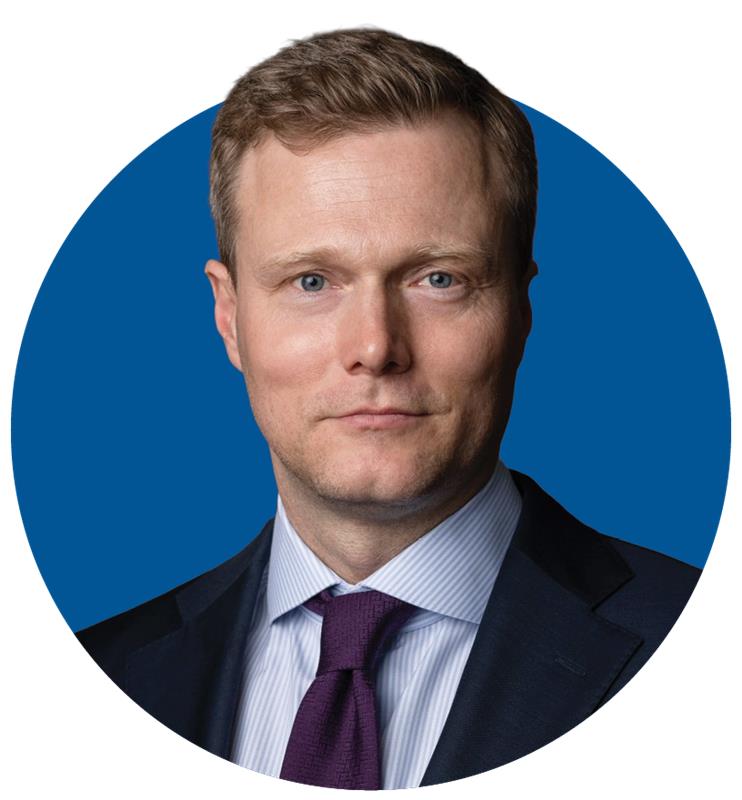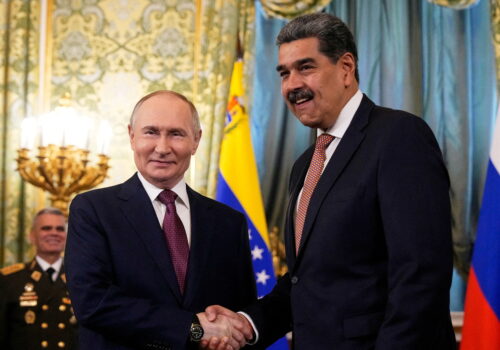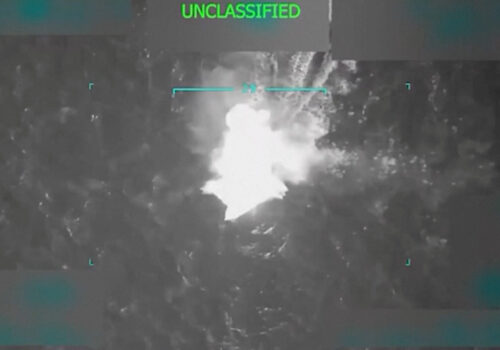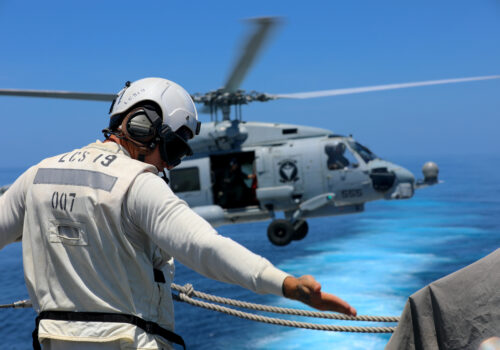The expert conversation: What’s Trump’s endgame in Venezuela?
US President Donald Trump has steadily accelerated his campaign of attacks on alleged drug boats in the Caribbean and Pacific Ocean, while building up US military forces in the region. Aside from the anti-drug mission, the US president and his allies have indicated that they intend to force out Venezuelan dictator Nicolás Maduro, though the administration reportedly told Congress this week that it doesn’t have the legal justifications for strikes inside the country right now.
To shed light on what’s going on and what to expect next, we spoke earlier this week with Matt Kroenig, vice president and senior director of the Atlantic Council’s Scowcroft Center for Strategy and Security, and Jason Marczak, vice president and senior director of the Atlantic Council’s Adrienne Arsht Latin America Center. This expert conversation has been lightly edited and condensed below.
Matt, you host a show called “So What’s the Strategy?” What do you think US strategy in the region is right now?
If there is a strategy, it’s not clear to me. Maybe there is, but it just hasn’t been articulated. A good strategy starts with clear goals. So, what is it that they’re trying to achieve? It seems like there are at least two possibilities—and, of course, it could be both.
One is that this is about removing Maduro from power, and that could make sense. Maduro has obviously been an anti-American dictator, not good for Venezuela or the United States. Option two is that this is about border security and stopping narco-trafficking.
So, what are the major steps to achieve these goals? The military buildup has been the most prominent recent element. Is this just about striking drug boats? Seems like it’s more than that. If it’s about removing Maduro, then is the hope that he’ll self-deport? Senators Rick Scott and Lindsey Graham were on the Sunday shows last week with similar talking points about how Maduro should just go to Russia or China. Or is it possibly preparing for strikes on the mainland, maybe against Maduro himself? The United States has had a long-standing policy against assassinating foreign leaders, but Trump doesn’t seem to mind breaking norms.
Jason, how do you hear that from a regional standpoint?
The president has said that his top goal is stopping the flow of illicit drugs into the United States. And in the Caribbean, Trinidad and Tobago in particular has been quite supportive of the strikes on the alleged drug-carrying vessels.
I think it’s also a signal to other countries in the region and around the world of how serious this administration is on security and stopping the flow of drugs. There have been other countries in the hemisphere where the administration has been putting pressure to do more to stop the flow of drugs into the United States, such as Colombia with the sanctioning of President Gustavo Petro and the decertification of Colombia as cooperating with the United States on drug-control strategy.
At the same time, Secretary of State Marco Rubio has been very clear on this from his days as a senator. The secretary wants to see the dictator Nicolás Maduro in Venezuela out of power. Given [Rubio’s] Cuban ancestry, it’s very personal to him as well—the rise of dictators and what that means for the people and the erosion of civil liberties that we’ve seen across Venezuela hits home for Rubio. As the president mentioned on 60 Minutes, he does want to see Maduro go. He does see his days as numbered. The question is, to what extent will the United States go to actually advance the removal of Maduro?
I do expect there to be limited strikes at some point on Venezuelan territory, linked to the illicit drug trade.
At the same time, Maduro is seen across the region as a cancer. The erosion of the Venezuelan economy, the erosion of civil rights, the erosion of political freedoms—that has led to the largest mass-migration crisis that this hemisphere has seen. And the implications of that are not just migrants coming to the US southern border. There are migrants coming to parts of the region that have never seen such numbers of migrants—Chile, for example.
Lastly, there are a number of indications that the Western Hemisphere will figure more prominently in [the Trump administration’s forthcoming] National Defense Strategy (NDS) than in previous defense strategies. And security and stability in our hemisphere requires Nicolás Maduro not being in the Miraflores Palace in Venezuela; he creates instability across the broader region.
Matt, this is your wheelhouse. Is this Caribbean buildup a soft launch of that strategy?

Matt Kroenig
Every national defense strategy essentially starts by saying the homeland is the most important. And I think that’s true for any country and any leader. What I’m hearing is that this NDS will start by saying the homeland and the Western Hemisphere are priority number one, but then the Indo-Pacific and China are number two, and so on.
But you do already see more of a focus on the Western Hemisphere than in past administrations, and clearly, with this military buildup, we haven’t seen anything like this in many years.
Coming back to something that Jason said, there are different camps within this administration who may see this issue differently. Jason is absolutely right that Rubio has long been calling for the removal of Maduro, and he’s obviously empowered as secretary of state and national security advisor. There are probably others in the administration, more in the MAGA restraint camp, who are more worried about border security and the flow of drugs but are probably opposed to military conflict against Venezuela directly. This is a group that’s been criticizing US policy toward Iraq and Afghanistan over the years for failed military intervention. So for now, the camps are aligned in favor of greater pressure against Venezuela, but I doubt that there’s a coherent strategy that they’ve all signed off on.
This military buildup comes as Trump just returned from Asia, where he presided over a peace agreement between Cambodia and Thailand. He frequently talks up his role as a peacemaker. Are we seeing a foreign policy doctrine emerge at this point from Trump?

Matt Kroenig
Well, he’s always used the term “peace through strength,” and I think both parts of that phrase are important. It’s peace through deterrence. He is skeptical of long, drawn-out military campaigns like [those in] Iraq, Afghanistan, Syria, and Ukraine, but is willing to use short, sharp, decisive force. We saw the strikes against Iranian General Qasem Soleimani in the first term. We saw the strikes against Iran’s nuclear program this summer.
And so, for him, strikes against drug infrastructure in Venezuela, as Jason just alluded to, or maybe even against Maduro or regime targets themselves, is not inconsistent with this idea of peace through strength. What I would not expect to see, though, is some kind of Panama or Grenada situation of a full-scale, boots-on-the-ground, regime-change operation. It’s hard for me to see the Trump-Vance administration going for that kind of military action.

Jason Marczak
I fully agree with Matt, and this is consistent with everything that I’ve been hearing as well. There’s a high potential that we’re going to see limited strikes in Venezuela but, again, no commitment of any type of US forces in a way that would put American troops in harm’s way. Although [it’s] outdated, Venezuela does have an air-defense system. The Russians were tweeting the other day that they’re willing to come and assist the Venezuelans as needed, although I doubt that Russia has any capacity to do so at this point. But the question is: For Trump, does Maduro actually need to be removed from power for him to claim success?
And related to that question: How tight is Maduro’s grip on power? What would it take to force him out?

Jason Marczak
There have been a number of different attempts at overthrowing Maduro over the years, and they are squashed pretty quickly. For one, you have Cuban agents who are embedded across the Venezuelan military and can quickly report any rebellious activities. And over the last twenty-five years, Venezuelan officials have also ensured that there is minimal communication among different military units to make it more difficult for a mass uprising. The most notable attempt to remove Maduro was five years ago—termed Operation Gideon—but the former Venezuelan troops never made it past the shores.
One of the ways that Maduro maintains that grip over the military is through the illicit activities that enrich the regime and thereby enrich the generals. So if we are able to significantly degrade Venezuela’s ability to engage in illicit activities—whether it’s drug trafficking, gold mining, arms trafficking, human smuggling, you name it—then Maduro has less resources to be able to pay off his generals, and that can hopefully lead to a desire from the armed forces to find a different path than one that’s dependent upon Maduro.
The context in Venezuela is really important as well. Unlike other countries where the US has intervened in order to topple a dictator without a clear democratic successor, there are clear leaders in waiting. There was a presidential election a year ago, in which Edmundo González, according to all voting sheets that have been made public, was elected as president. And he’s currently living in exile. María Corina Machado, who won the Nobel Peace Prize, is there in Venezuela fighting for the government that was actually elected a year ago. Venezuela also has its own vast critical resources and oil reserves to provide key economic resources, and there is a regional desire to help to promote stability [in the country].
Now, Maduro has supposedly offered to leave power. The administration has said that those offers have been rejected. But what we would need to avoid, in the case of Maduro leaving power, is that another one of his henchmen just assumes the presidency. There is robust support for the democratic opposition in Venezuela, but it’s about making it clear to the Venezuelan military as well that their future rests on respecting a transition that adheres to democratic principles.

Matt Kroenig
Jason was talking about other contexts. I’ve worked on US policy toward Iran for more than twenty years, and we have seen uprisings against the regime there, but the reality has been that the regime has been willing to kill to stay in power. That could also be a critical issue in Venezuela. As long as the security forces are willing to kill innocent civilians to keep Maduro or his successors in power, the US ability to engineer regime change from afar is limited.
Just Maduro himself leaving is probably not enough to get the goals that the Trump administration is looking for.

Jason Marczak
Picking up on Matt’s point, in the hopeful event that Maduro leaves, it needs to be made abundantly clear to the Venezuelan military the severe consequences of killing to remain in power. Most of these forces are not loyal to Nicolás Maduro. Many are either scared of being thrown in jail if they go against Maduro or are directly benefiting from the illicit financial resources that Maduro procures and then doles out to military officials. If those resources are drying up, well, do you want to take additional action to perpetuate a regime that’s falling? Or do you want to be on the right side of history?
Matthew Kroenig is vice president and senior director of the Atlantic Council’s Scowcroft Center for Strategy and Security.
Jason Marczak is vice president and senior director at the Atlantic Council’s Adrienne Arsht Latin America Center.
Further reading
Tue, Nov 4, 2025
Facing the threat of US strikes, Maduro has requested Russia’s help. He shouldn’t expect much.
New Atlanticist By Imran Bayoumi, Shelby Magid
Focused on its war against Ukraine and struggling with the effects of Western sanctions, the Kremlin is unlikely to provide significant assistance to the Maduro regime.
Fri, Sep 12, 2025
Was Trump’s strike on an alleged Venezuelan drug boat legal?
New Atlanticist By Celeste Kmiotek
It’s worth looking in detail at where the US strike on a suspected drug-trafficking vessel on September 2 sits in relation to international law.
Wed, Sep 10, 2025
Why the Pentagon had been reluctant to combat narco-trafficking in the Western Hemisphere
New Atlanticist By Kevin Whitaker
The recent US strike on a suspected drug-carrying vessel is a reminder that the US military had for years resisted getting more deeply involved in counternarcotics.
Image: Chief Aviation Boatswain's Mate (Aircraft Handling) Mike Duffy, assigned to Air Department aboard the world's largest aircraft carrier, USS Gerald R. Ford (CVN 78), signals to an F/A-18E Super Hornet attached to Strike Fighter Squadron 31, on the flight deck, Oct. 30, 2025. Gerald R. Ford, a first-in-class aircraft carrier and deployed flagship of Carrier Strike Group 12, is on a scheduled deployment in the U.S. 6th Fleet area of operations to support the warfighting effectiveness, lethality and readiness of U.S. Naval Forces Europe-Africa, and defend U.S., Allied and partner interests in the region. (U.S. Navy photo by Mass Communication Specialist Seaman Apprentice Zamirah Connor)



